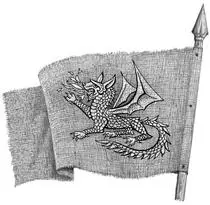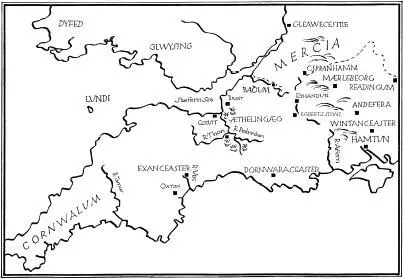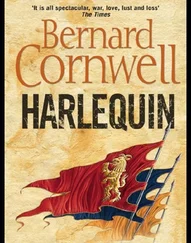

Published by HarperCollins Publishers Ltd
1 London Bridge Street
London SE1 9GF
www.harpercollins.co.uk
First published in Great Britain by HarperCollins Publishers 2005
Copyright © Bernard Cornwell 2005
Cover images © Shutterstock.com(stone texture, silver pendant)
Cover layout design © HarperCollins Publishers Ltd 2016
Cover illustration © Lee Gibbons/Tin Moon – www.leegibbons.co.uk
Bernard Cornwell asserts the moral right to be identified as the author of this work
A catalogue record for this book is available from the British Library
This novel is entirely a work of fiction. The names, characters and incidents portrayed in it, while at times based on historical figures, are the work of the author’s imagination.
All rights reserved under International and Pan-American Copyright Conventions. By payment of the required fees, you have been granted the non-exclusive, non-transferable right to access and read the text of this e-book on-screen. No part of this text may be reproduced, transmitted, downloaded, decompiled, reverse engineered, or stored in or introduced into any information storage and retrieval system, in any form or by any means, whether electronic or mechanical, now known or hereinafter invented, without the express written permission of HarperCollins.
Source ISBN: 9780008139483
Ebook Edition © July 2009 ISBN: 9780007338825
Version: 2019-09-27
THE PALE HORSEMAN
is for
George MacDonald Fraser,
in admiration
Ac her forlo berað; fugelas singað, gylleð grœghama.
For here starts war, carrion birds sing, and grey wolves howl.
From The Fight at Finnsburh
Contents
Cover
Title Page
Copyright
Dedication
Epigraph
Map
Place Names
Part One: VIKING
Chapter One
Chapter Two
Chapter Three
Part Two: THE SWAMP KING
Chapter Four
Chapter Five
Chapter Six
Chapter Seven
Chapter Eight
Chapter Nine
Chapter Ten
Chapter Eleven
Part Three: THE FYRD
Chapter Twelve
Chapter Thirteen
Historical Note
Keep Reading …
About the Author
Also by Bernard Cornwell
About the Publisher

The spelling of Place Names in Anglo-Saxon England was an uncertain business, with no consistency and no agreement even about the name itself. Thus London was variously rendered as Lundonia, Lundenberg, Lundenne, Lundene, Lundenwic, Lundenceaster and Lundres. Doubtless some readers will prefer other versions of the names listed below, but I have usually employed whichever spelling is cited in the Oxford Dictionary of English Place Names for the years nearest or contained within Alfred’s reign, 871–899 AD, but even that solution is not foolproof. Hayling Island, in 956, was written as both Heilincigae and Hæglingaiggæ. Nor have I been consistent myself; I use England instead of Englaland, and have preferred the modern form Northumbria to Norðhymbralond to avoid the suggestion that the boundaries of the ancient kingdom coincide with those of the modern county. So this list, like the spellings themselves, is capricious.
| Æsc’s Hill |
Ashdown, Berkshire |
| Æthelingæg |
Athelney, Somerset |
| Afen |
River Avon, Wiltshire |
| Andefera |
Andover, Wiltshire |
| Baðum (pronounced Bathum) |
Bath, Avon |
| Bebbanburg |
Bamburgh Castle, Northumberland |
| Brant |
Brent Knoll, Somerset |
| Bru |
River Brue, Somerset |
| Cippanhamm |
Chippenham, Wiltshire |
| Contwaraburg |
Canterbury, Kent |
| Cornwalum |
Cornwall |
| Cracgelad |
Cricklade, Wiltshire |
| Cridianton |
Crediton, Devon |
| Cynuit |
Cynuit Hillfort, nr. Cannington, Somerset |
| Dærentmora |
Dartmoor, Devon |
| Defereal |
Kingston Deverill, Wiltshire |
| Defnascir |
Devonshire |
| Dornwaraceaster |
Dorchester, Dorset |
| Dreyndynas |
‘Fort of thorns’, fictional, set in Cornwall |
| Dunholm |
Durham, County Durham |
| Dyfed |
South-west Wales, mostly now Pembrokeshire |
| Dyflin |
Dublin, Eire |
| Eoferwic |
York (also the Danish Jorvic, pronounced Yorvik) |
| Ethandun |
Edington, Wiltshire |
| Exanceaster |
Exeter, Devon |
| Exanmynster |
Exminster, Devon |
| Gewæsc |
The Wash |
| Gifle |
Yeovil, Somerset |
| Gleawecestre |
Gloucester, Gloucestershire |
| Glwysing |
Welsh kingdom, approximately Glamorgan and Gwent |
| Hamptonscir |
Hampshire |
| Hamtun |
Southampton, Hampshire |
| Lindisfarena |
Lindisfarne (Holy Island), Northumberland |
| Lundene |
London |
| Lundi |
Lundy Island, Devon |
| Mærlebeorg |
Marlborough, Wiltshire |
| Ocmundtun |
Okehampton, Devon |
| Palfleot |
Pawlett, Somerset |
| Pedredan |
River Parrett |
| Penwith |
Land’s End, Cornwall |
| Readingum |
Reading, Berkshire |
| Sæfern |
River Severn |
| Sceapig |
Isle of Sheppey, Kent |
| Scireburnan |
Sherborne, Dorset |
| Sillans |
The Scilly Isles |
| Soppan Byrg |
Chipping Sodbury, Gloucestershire |
| Sumorsæte |
Somerset |
| Suth Seaxa |
Sussex (South Saxons) |
| Tamur |
River Tamar |
| Temes |
River Thames |
| Thon |
River Tone, Somerset |
| Thornsæta |
Dorset |
| Uisc |
River Exe |
| Werham |
Wareham, Dorset |
| Wilig |
River Wylye |
| Wiltunscir |
Wiltshire |
| Winburnan |
Wimborne Minster, Dorset |
| Wintanceaster |
Winchester, Hampshire |

These days I look at twenty-year-olds and think they are pathetically young, scarcely weaned from their mothers’ tits, but when I was twenty I considered myself a full-grown man. I had fathered a child, fought in the shield wall, and was loath to take advice from anyone. In short I was arrogant, stupid and headstrong. Which is why, after our victory at Cynuit, I did the wrong thing.
Читать дальше















